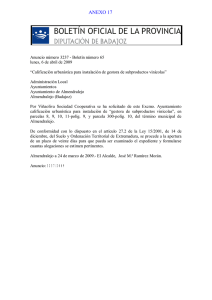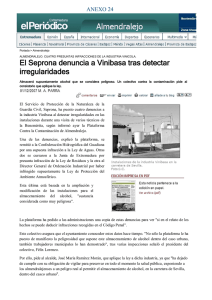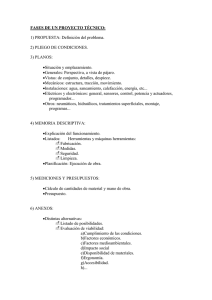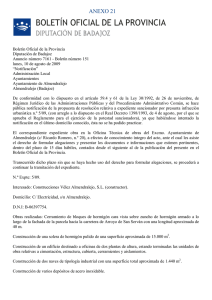TEXT, Fr Comm Answers Questions By Smagadi 22Feb2010, FrCommAnswersQuestionsBySmagadi_22Feb2010.pdf, 39 KB
Anuncio
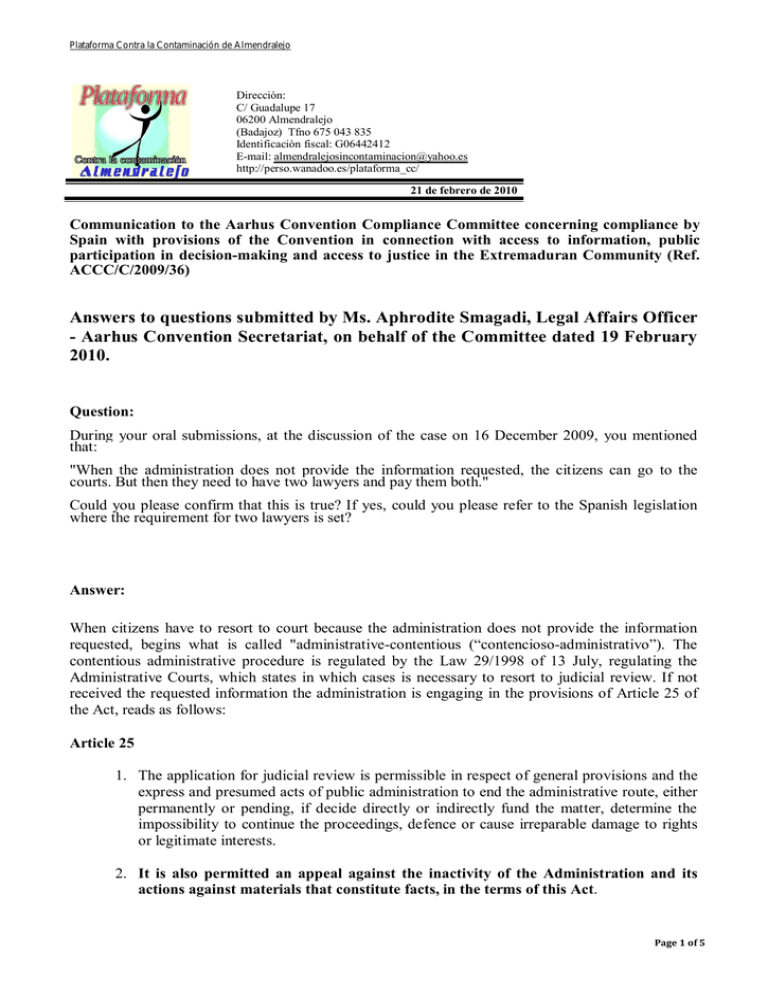
Plataforma Contra la Contaminación de Almendralejo Dirección: C/ Guadalupe 17 06200 Almendralejo (Badajoz) Tfno 675 043 835 Identificación fiscal: G06442412 E-mail: almendralejosincontaminacion@yahoo.es http://perso.wanadoo.es/plataforma_cc/ 21 de febrero de 2010 Communication to the Aarhus Convention Compliance Committee concerning compliance by Spain with provisions of the Convention in connection with access to information, public participation in decision-making and access to justice in the Extremaduran Community (Ref. ACCC/C/2009/36) Answers to questions submitted by Ms. Aphrodite Smagadi, Legal Affairs Officer - Aarhus Convention Secretariat, on behalf of the Committee dated 19 February 2010. Question: During your oral submissions, at the discussion of the case on 16 December 2009, you mentioned that: "When the administration does not provide the information requested, the citizens can go to the courts. But then they need to have two lawyers and pay them both." Could you please confirm that this is true? If yes, could you please refer to the Spanish legislation where the requirement for two lawyers is set? Answer: When citizens have to resort to court because the administration does not provide the information requested, begins what is called "administrative-contentious (“contencioso-administrativo”). The contentious administrative procedure is regulated by the Law 29/1998 of 13 July, regulating the Administrative Courts, which states in which cases is necessary to resort to judicial review. If not received the requested information the administration is engaging in the provisions of Article 25 of the Act, reads as follows: Article 25 1. The application for judicial review is permissible in respect of general provisions and the express and presumed acts of public administration to end the administrative route, either permanently or pending, if decide directly or indirectly fund the matter, determine the impossibility to continue the proceedings, defence or cause irreparable damage to rights or legitimate interests. 2. It is also permitted an appeal against the inactivity of the Administration and its actions against materials that constitute facts, in the terms of this Act. Page 1 of 5 Plataforma Contra la Contaminación de Almendralejo To start the application for judicial review (“contencioso-administrativo”), the Law 29/1998 states: Article 23 1. In their proceedings in front of single Judge, the parties may give their representation to an Attorney and will be assisted in any event, by lawyer. When the parties confer its representation to a lawyer, he is to notify the proceedings. 2. In their proceedings in front of associated bodies, the parties must give their representation to an Attorney and be assisted by Advocate. 3. They may, however, appear on their own public officials to protect their statutory rights where they relate to personnel matters not involving entrenched separation of public employees. Regarding the costs, the Act provides: Article 139 1. In first or last instance, the court, when sentencing order or resolve resources or incidents before it is promoting an, impose the costs, duly justified, the party we held for his action or interposed in bad faith resources or recklessness. Notwithstanding the preceding paragraph shall be imposed costs to the party whose claims have been dismissed if otherwise the action would lose its purpose. 2. In other instances or degrees are imposed on the appellant if the appeal is dismissed entirely, unless the court, for duly, appreciate the concurrence of circumstances justifying the non-taxation. 3. The imposition of costs may be to the entirety, or a part thereof up to a maximum. 4. For the levy of the costs imposed on individuals, the creditor Administration shall use the procedure of urgency, in default of voluntary payment. 5. In no event shall impose the costs to the Prosecutor. The provisions of Article 23 of Law 29/1998 of 13 July, regulating the Administrative Courts, require the recruitment, and therefore pay an attorney and a lawyer. In addition, the litigant who loses the case must pay any costs associated with the process (costas), including attorney's fees and solicitor of the defendant, in this case the administration, as provided in Article 139 of Law 29/1998. Page 2 of 5 Plataforma Contra la Contaminación de Almendralejo I hope I have clarified the doubts which the Committee presents its questions. Anyway, I stand at the disposal of the Committee to provide information and clarify any doubts that may arise during the process. Please do not hesitate to contact me, should you have any queries. With kindest regards, Almendralejo, 21 of February of 2010 Félix Lorenzo Donoso Presidente de la Plataforma Contra la Contaminación de Almendralejo Page 3 of 5 Plataforma Contra la Contaminación de Almendralejo Note: The following is transcribed verbatim in Spanish articles of the Law 29/1998 of 13 July, regulating the Administrative Courts. Artículo 23. 1. En sus actuaciones ante órganos unipersonales, las partes podrán conferir su representación a un Procurador y serán asistidas, en todo caso, por Abogado. Cuando las partes confieran su representación al Abogado, será a éste a quien se notifiquen las actuaciones. 2. En sus actuaciones ante órganos colegiados, las partes deberán conferir su representación a un Procurador y ser asistidas por Abogado. 3. Podrán, no obstante, comparecer por sí mismos los funcionarios públicos en defensa de sus derechos estatutarios, cuando se refieran a cuestiones de personal que no impliquen separación de empleados públicos inamovibles. Artículo 25. 1. El recurso contencioso-administrativo es admisible en relación con las disposiciones de carácter general y con los actos expresos y presuntos de la Administración pública que pongan fin a la vía administrativa, ya sean definitivos o de trámite, si estos últimos deciden directa o indirectamente el fondo del asunto, determinan la imposibilidad de continuar el procedimiento, producen indefensión o perjuicio irreparable a derechos o intereses legítimos. 2. También es admisible el recurso contra la inactividad de la Administración y contra sus actuaciones materiales que constituyan vía de hecho, en los términos establecidos en esta Ley. Artículo 139. 1. En primera o única instancia, el órgano jurisdiccional, al dictar sentencia o al resolver por auto los recursos o incidentes que ante el mismo se promovieren, impondrá las costas, razonándolo debidamente, a la parte que sostuviere su acción o interpusiere los recursos con mala fe o temeridad. No obstante lo dispuesto en el párrafo anterior, se impondrán las costas a la parte cuyas pretensiones hayan sido desestimadas cuando de otra manera se haría perder al recurso su finalidad. 2. En las demás instancias o grados se impondrán al recurrente si se desestima totalmente el recurso, salvo que el órgano jurisdiccional, razonándolo debidamente, aprecie la concurrencia de circunstancias que justifiquen su no imposición. Page 4 of 5 Plataforma Contra la Contaminación de Almendralejo 3. La imposición de las costas podrá ser a la totalidad, a una parte de éstas o hasta una cifra máxima. 4. Para la exacción de las costas impuestas a particulares, la Administración acreedora utilizará el procedimiento de apremio, en defecto de pago voluntario. 5. En ningún caso se impondrán las costas al Ministerio Fiscal. Page 5 of 5
